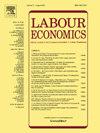Rigid yet resilient: Firms’ margins of adjustment to demand shocks in regulated labour markets
IF 2.6
2区 经济学
Q2 ECONOMICS
引用次数: 0
Abstract
We investigate how firms adjust to demand shocks when wages and employment determination are regulated. Using firm-level data for the Italian metal engineering industry from 2009 to 2021, we estimate the elasticity of the wage bill to changes in firm's real sales. We disentangle the effect on wage components (base wage and wage cushion) and labour inputs (permanent or temporary employment and working hours). Results show that the elasticity of the wage bill to demand shocks mainly works through adjustment of working hours (especially via short-time work) and partly employment, while wages are less sensitive. Unions at the workplace reduce employment adjustment through a more intensive use of short-time work schemes. The lower employment adjustment to changes in sales in unionized firms does not depend on past investments or innovation, and it is associated to higher responsiveness of profits to declining sales only in weakly unionized firms.
刚性但有弹性:在受监管的劳动力市场中,企业对需求冲击的调整余地
我们研究了当工资和就业决定受到监管时,企业如何适应需求冲击。利用2009年至2021年意大利金属工程行业的企业层面数据,我们估计了工资账单对企业实际销售额变化的弹性。我们分析了对工资组成部分(基本工资和工资缓冲)和劳动力投入(永久或临时就业和工作时间)的影响。结果表明,工资账单对需求冲击的弹性主要通过调整工作时间(特别是通过短期工作)和部分就业来实现,而工资对需求冲击的敏感性较低。工作场所的工会通过更密集地使用短期工作计划来减少就业调整。有工会组织的企业对销售变化的较低的就业调整并不取决于过去的投资或创新,只有在工会组织较弱的企业中,它才与利润对销售下降的较高反应有关。
本文章由计算机程序翻译,如有差异,请以英文原文为准。
求助全文
约1分钟内获得全文
求助全文
来源期刊

Labour Economics
ECONOMICS-
CiteScore
3.60
自引率
8.30%
发文量
142
期刊介绍:
Labour Economics is devoted to publishing research in the field of labour economics both on the microeconomic and on the macroeconomic level, in a balanced mix of theory, empirical testing and policy applications. It gives due recognition to analysis and explanation of institutional arrangements of national labour markets and the impact of these institutions on labour market outcomes.
 求助内容:
求助内容: 应助结果提醒方式:
应助结果提醒方式:


